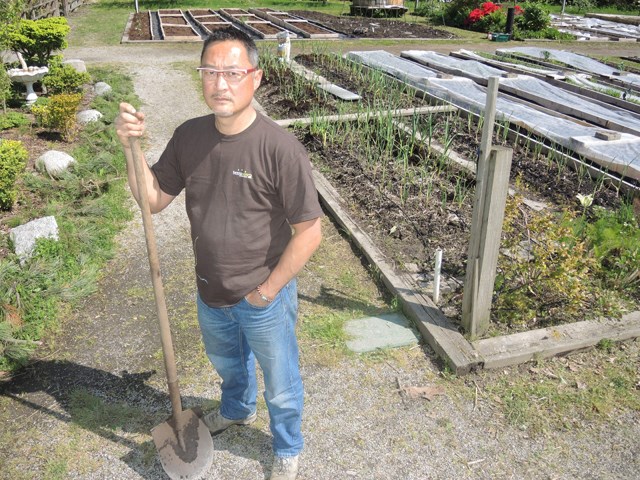TAKING the weight off for a minute at a picnic bench, Ian Lai gulped a few mouthfuls of water; content with the seven-hour graft he’d just put in maintaining his community garden plot at Terra Nova Rural Park in Richmond.
Imagine, then, Lai’s acute sense of injustice when, right in front of him, he watched with wide-eyes an Asian couple helping themselves to the very garlic bulbs he’d been slaving over all day.
Racing over to the rescue, Lai remonstrated with the brazen pair of thieves.
“I was over there like a hound and shouted ‘that doesn’t belong to you,’” said Lai, founder and program director of the Richmond Schoolyard Society at Terra Nova Rural Park, who also runs his own urban agricultural consulting business.
“The guy just looked at me and said ‘I don’t speak English,’ and walked off and got into their flashy-looking BWV SUV.
“There was another couple walking in the park, and they joined them in the car.”
Lai said Saturday’s incident is not the first time he’s had to deal with thieves at the community gardens, but he feels the culprits are getting bolder.
“I tell you, people are getting more and more brazen,” he said.
“We really need to educate them to help them understand what they’re doing is wrong.
“It’s been increasing every year and more and more of the gardeners here are telling me stories about stuff going missing and having to chase people away.”
Jill Wright, a Richmond Garden Club committee member, said a City of Richmond grasscutter caught someone taking plants from Paulik Park just last week.
“As usual, they say they don’t speak English and then it’s the whole pantomime routine of acting out what’s wrong with what they’re doing,” said Wright, who’s in charge of the club stewardship of the central Richmond park.
“Once you say ‘no’ and ‘police,’ they seem to get it and leave. The volunteers who maintain the park here quite rightly get very annoyed and angry; it’s driving people insane.”
Wright said it’s not quite as bad as in 2008 when the club took over maintaining the park for the city.
“I think we have more eyes out here now, more vigilance,” she added.
“I don’t think (the people stealing) have any idea how this affects the volunteers, it’s so disrespectful.”
The Richmond News reported last year how thefts from community gardens, including from an elementary school garlic bed, were on the rise across Richmond.
Colin Dring, Richmond Food Security Society’s executive director, said the thefts “continue to be an issue and it’s started really early this season.”
However, this year, as well as prized vegetables, it’s plants and ornaments that are getting stolen, said Dring. “The gardening community is starting to come back to the lots and they’re noticing all kinds of things missing,” said Dring.
Asked how the community garden groups plan to tackle the problem this season, Dring said the educational approach and encouraging people to follow up with city bylaw officers when something happens is still the best way forward.
Putting up bilingual warning signs, explaining it’s not a free-for-all, isn’t an option, added Dring.
“We’re looking at visual signage as part of the educational tool, as the city has a one-language rule when it comes to signs in city parks,” he said.
“There’s no sense anyway in putting up signs in different languages; we’d need about 12 in Richmond!” City of Richmond spokesperson Kim Decker said there are universal signs in city parks — such as visual “hands-off” diagrams — and there are English ones with the relevant bylaw number quoted.
Decker added that the city made one exception at Lang Park in the city centre, where a rodent problem motivated the city to temporarily erect a sign in English and Chinese, urging residents to not feed animals or leave food lying around.
Dring said the community is also looking at creating more distinction between the community garden areas and the general park areas.
“Short of putting surveillance out there, there’s not much more we can do,” he explained.
“We need a more broad community out there, more eyes on the site and bringing that community linkage to the community gardens.”
Wright said it might even be worth looking into changing the reference “community gardens” itself.
“For some people ‘community gardens’ implies a free-for-all,” she said.
Despite still feeling a little aggrieved at someone helping themselves to the fruits of his sweat and toil, Lai would love to invite the offending couple back.
“I’d love for them to come back and share the beauty of my labour around here,” said Lai.



